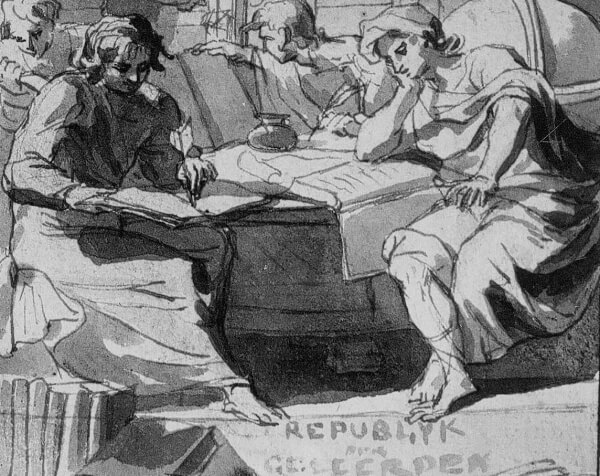Every day, amid the maelstrom of words, images, and sounds that besiege us, we experience the unfortunate truth that communication is not the same as communion. Communion, of course, is the higher goal—not a mere exchange of information or ideas, but a deeper sense of solidarity grounded in our shared humanity. The idea of communion may be idealistic—it’s something that can be experienced only fitfully and partially—and yet the human heart longs for it, and the commonweal needs as much of it as we can muster.
Our attempts to overcome isolation have too often been coopted by populism, identity politics, and other forms of tribalism on both the left and the right. These groups are reductionistic—they rely on ideological simplifications, which are, in turn, fueled by a sort of ravenous moralism, the constant need to signal virtue and belittle enemies.
The result is that we are tossed about in a roiling sea, each of us in our little flotillas, waving our badges of righteousness about in a sort of furious semaphore.
If we truly care about the state of our culture—if we are at least haunted by a desire for communion—we are going to have to create havens for contemplation and conversation. We will need to generate the kind of experiences that can only take place after we have undergone a strenuous journey into the interior, where attention, judgment, and reflection can be cultivated.
Tribalism thrives on division and thanks to social media it offers instant gratification. But like a drug its effects are brief and need to be constantly repeated—and like-mindedness is not the same as true communion. In that sense politicized tribalism is largely an extension of the commodification endemic to a market economy: we wear our opinions like we wear our designer jeans—for display. Politics is the ultimate Big Business and we are the consumers.
Communion, on the other hand, requires time, effort, circumspection—what Keats once called “negative capability,” the capacity for “being in uncertainties, mysteries, doubts, without any irritable reaching after fact and reason.”
Tribalism champions an ethic of heroic striving to redress injustice and rescue us from the apocalypse; communion is an ethic of solidarity and contingency, an awareness of our inextricably mixed motives and common brokenness.
Literature has traditionally been one of the pathways toward the contemplative inwardness that was once so highly valued by our culture. But literature itself is not immune to the larger social forces affecting us all. Consider, for example, the rise of what critic Becca Rothfeld has called “sanctimony literature.”
Sanctimony literature is, in effect, an extension of social media: it is full of self-promotion and the airing of performatively righteous opinions. It exists largely to make poster-cum-authors look good and scrollers-cum-readers feel good for appreciating the poster-cum-authors’ goodness. In “Everybody’s Protest Novel,” James Baldwin wrote of sententious reformist fiction like Uncle Tom’s Cabin that “we receive a very definite thrill of virtue from the fact that we are reading such a book at all.” Sanctimony literature has similarly affirming and consoling effects: it serves to make us feel proud that we share its ethical assumptions.
It is widely believed that “sanctimony literature” is the property of the political left, but that is only because the right is producing little that might tempt one to use the term “literature.” The right can only muster what might be called “sanctimony criticism,” the loud lament of the disconsolate declinist.
Sanctimony literature produces simplistic allegories, devoid of ambiguity or nuance, treating art in an instrumentalist fashion.
Sanctimony criticism generates a gnostic alienation from the present moment, blind to good work even when it is right there, waiting to be discovered.
Thankfully, there is another way to engage with literary culture. It may be idealistic but it is not a mere fantasy. It may be something only practiced by a few, but the witness of a few can ripple outward in powerful ways.
One of the greatest examples of this alternative approach can be found in a historical phenomenon known as the Republic of Letters, which was an active, conscious movement that lasted nearly 500 years.
The term was first used by Italian humanists in the fifteenth century—and that first use came at a key moment when many of the leading scholars and churchmen of the day were seeking a restoration of unity. During the Council of Constance in 1417—which involved the ending of the “Great Schism” (when there was more than one claimant to the papacy)—a young humanist named Francesco Barbaro wrote to thank an elder for his services to the respublica literaria, a phrase modeled on respublica christiana, which the Council was seeking to heal. The term caught on.
As the late French scholar Marc Fumaroli put it in his seminal work, The Republic of Letters:
The citizens of this invisible republic were not the active cives of ancient republics, nor the passive members of modern monarchies, but the subjects of an unprecedented relationship with self, with the other, with knowledge, and with truth.
Confronted by a culture that was rapidly becoming polarized and politicized, the humanists sought to move away from the dry-as-dust logic of late medieval scholasticism, which had become more and more abstract and absolutist (a far cry from Thomas Aquinas), toward a model of communication based on rhetoric as the art of persuasion. They also sensed the potential violence behind the escalating theological disputes—the culture wars of their time.
According to Fumaroli, the humanists effected a shift toward a “rhetorical dialogical model” that emphasized more private forms of literary activity—the letter, the conversation, and the essay (this latter form would soon find its founding figure in Montaigne).
That the members of the Republic of Letters cherished more private forms of literary engagement did not signal a withdrawal from the public realm so much as it stressed the need for forms of contemplative interiority and reflection away from the contentious public debates over politics and religion. Conflict is inevitable, but it makes all the difference in the world how one prepares to enter the fray, especially if action is informed by contemplation.
It was in the person of Desiderius Erasmus that the Republic of Letters would find its first international superstar. As a critic of scholasticism and the monastic orders—both of which he felt had become smug and decadent—and as a multi-tasking literary translator of the Bible and the Church Fathers, author of satirical dialogues, and prolific letter-writer—Erasmus sought, in Fumaroli’s words “a spiritual power that was more disarmed, but more authentic because it could be more unifying than other powers” (author’s emphasis).
The citizens of the Republic of Letters created a network of readers and writers that crossed national, ethnic, and theological borders. This didn’t require them to abandon their local loyalties and responsibilities, but it did encourage them to mitigate the “armed” factions whenever they became ideological and oppressive.
The forces of literalism are always with us—those who for one reason or another seek to instrumentalize both words and people and to scorn literature’s willingness to explore the ambiguities of the human condition. Consider the recent editorialist who railed against writers who refused to seek political ends with their work and wished only to write about “flowers and moons.” Justin E.H. Smith recently responded to this by saying “the moon is one of the basic things that orients human beings in the world, that places us in the cosmos and in nature, and consoles us.” The ability to write about flowers and moons, he continues, is “what makes literature so incalculably powerful: it generates worlds within worlds, which are quite often beautiful worlds within ugly ones. [M]uch of the most powerful nature writing I know has in fact been produced by people enduring brutal political persecution.”
Beauty is one of those things that refuses to be instrumentalized—that’s why it is such an important counterbalance to the pragmatism and instrumentalism of our times. And it’s also one of the hallmarks of the life-affirming and joyous aspects of the Republic of Letters: the deep enjoyment that can be shared by those who read closely and well—the ever-present sense of literature as meaningful play, even when it deals with the most tragic subjects. Erasmus wrote a guide to the education of a Christian prince—but he also wrote The Praise of Folly, a playful satire if there ever was one.
As more than one historian has pointed out, the Republic of Letters often existed outside of mainstream institutions, such as the universities. You could find its denizens in various unlikely places, including the legal profession, the church, and yes, even book publishers, from Aldus Manutius and Johann Froben to Kurt Wolff, Roberto Calasso, and Leonard and Virginia Woolf.
It is our hope that Slant Books will make a small but significant contribution to extending the tradition of the Republic of Letters in our time—in the service of true communion.





